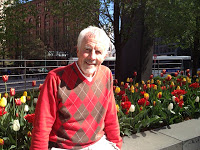As a young adult in seminary discussions I realized that sometimes students and professors alike didn’t know what I was going on about. A professor would listen to my ideas and respond, “Very interesting, Mr. Hoyle.” I took it he had no clear understanding of my perspective. That was okay, something I had encountered most of my life. I was talking about one of these seminary “interesting” instances with my mentor Katherine Williams. “They must think I’m strange,” I concluded.
“You are strange, Phillip,” she replied without hesitation.
Strange was not new to me. Although I didn’t feel particularly unaccepted or unacceptable as a teenager, I was aware that my sexual yearnings were unusual enough that they could get me into a lot of trouble or at least make my life a problem to other folk. Besides that, I was mildly nerdy but found my niche in music. If any musician fits in, I fit in easily enough singing in church, school and community. I was a reluctant leader in a couple of school organizations. I felt different; I was different: for instance, I didn’t know any other kids my age who organized music groups; I didn’t know very many guys who studied as attentively as I did although I admit I didn’t over-do it; I was physically rather uncoordinated, but not so much as to be made into a fool; I had good humor; I was independent and happy to be so. My feeling different didn’t make me feel particularly bad since I was easily entertained, easy going, and tolerant of groups and different kinds of people. By that time in my life I was reconciled to the fact that I was quite different and that the difference was acceptable to me if not to anyone else.
In college, I felt attracted to three guys: Todd, Dirk, and Chad. Todd and Chad seemed straight. I assumed Dirk was but now wonder if he was bisexual. He seemed somehow attracted to me as if he knew I was do-able. We never went beyond touching disguised as wrestling. Straight Chad was rather needy, and I fell for him. He was the first person I ever lost sleep over. But I was on an earnest straight road toward marriage. After seven years of marriage, I had a one-night stand with a gay friend. Our friendship continued. After nine years of marriage, I fell in love with a man and forged a friendship that after five years added a sexual element. The sex was sporadic, yet the love and interest remained constant.
While living in Albuquerque, a mid-life crisis led me into two homosexual affairs. I conducted these contacts with less care than before as I explored an increasingly gay world. The feelings had changed; my feelings.
Around that time a gay friend said to me, “No one can grow up gay in America without developing some neurosis.” His assertion would mean all gays need psychiatric help. I objected to the notion but then recalled hearing a lecture by a psychiatrist who reckoned ninety per cent of his patients didn’t really need his help. He judged they needed trusted friends to talk with. He laughed at himself saying he was a highly paid substitute friend. The neurosis, if that is the accurate term, subsides when one is accepted in love.
My Albuquerque affairs seemed that to me: the friendships that could sustain me and my sanity. They also were sexual. The first one would never be more than sex play, play I found exciting and that helped me understand so much about my own needs. It afforded the sexual contrast, the complement I desired. The second affair had an emotionally complicated excitement the first did not proffer yet it was sexually boring: the techniques my partner initiated were always the same. I realized sex in my marriage had measures of all these experiences, but the feelings of the homosex offered an amazing contrast. I discovered needs and joys that thrilled me when with these two men. (No, there was never a three-way. Oh well.)
Much of my life I have felt different. I continue to feel different. I’m sure it’s not just because I am gay or that I was always homosexual. It’s the whole package of my life, my different and strange life. I love it. I love myself. I love life.
© Denver, 2011
About the Author
He also blogs at artandmorebyphilhoyle.blogspot


